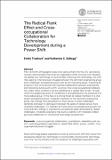| dc.contributor.author | Truelove, Emily Stecker | |
| dc.contributor.author | Kellogg, Katherine C. | |
| dc.date.accessioned | 2017-02-10T16:23:57Z | |
| dc.date.available | 2017-02-10T16:23:57Z | |
| dc.date.issued | 2016-04 | |
| dc.identifier.issn | 0001-8392 | |
| dc.identifier.issn | 1930-3815 | |
| dc.identifier.uri | http://hdl.handle.net/1721.1/106892 | |
| dc.description.abstract | This 12-month ethnographic study of an early entrant into the U.S. car-sharing industry demonstrates that when an organization shifts its focus from developing radical new technology to incrementally improving this technology, the shift may spark an internal power struggle between the dominant engineering group and a challenger occupational group such as the marketing group. Analyzing 42 projects in two time periods that required collaboration between engineering and marketing during such a shift, we show how cross-occupational collaboration under these conditions can be facilitated by a radical flank threat, through which the bargaining power of moderates is strengthened by the presence of a more-radical group. In the face of a strong threat by radical members of a challenger occupational group, moderate members of the dominant engineering group may change their perceptions of their power to resist challengers’ demands and begin to distinguish between the goals of radical versus more-moderate challengers. To maintain as much power as possible and prevent the more-dramatic change in engineering occupational goals demanded by radical challengers, moderate engineers may build a coalition with moderate challengers and collaborate for incremental technology development. | en_US |
| dc.language.iso | en_US | |
| dc.publisher | Sage Publications | en_US |
| dc.relation.isversionof | http://dx.doi.org/10.1177/0001839216647679 | en_US |
| dc.rights | Creative Commons Attribution-NonCommercial 4.0 International | en_US |
| dc.rights.uri | http://creativecommons.org/licenses/by-nc/4.0/ | en_US |
| dc.source | Prof. Kellogg | en_US |
| dc.title | The Radical Flank Effect and Cross-occupational Collaboration for Technology Development during a Power Shift | en_US |
| dc.type | Article | en_US |
| dc.identifier.citation | Truelove, Emily, and Katherine C. Kellogg. “The Radical Flank Effect and Cross-Occupational Collaboration for Technology Development during a Power Shift.” Administrative Science Quarterly 61.4 (2016): 662–701. | en_US |
| dc.contributor.department | Sloan School of Management | en_US |
| dc.contributor.approver | Kellogg, Katherine C. | en_US |
| dc.contributor.mitauthor | Truelove, Emily Stecker | |
| dc.contributor.mitauthor | Kellogg, Katherine C. | |
| dc.relation.journal | Administrative Science Quarterly | en_US |
| dc.eprint.version | Final published version | en_US |
| dc.type.uri | http://purl.org/eprint/type/JournalArticle | en_US |
| eprint.status | http://purl.org/eprint/status/PeerReviewed | en_US |
| dspace.orderedauthors | Truelove, Emily; Kellogg, Katherine C. | en_US |
| dspace.embargo.terms | N | en_US |
| dc.identifier.orcid | https://orcid.org/0000-0002-4934-2584 | |
| dc.identifier.orcid | https://orcid.org/0000-0003-4372-3498 | |
| mit.license | PUBLISHER_CC | en_US |
